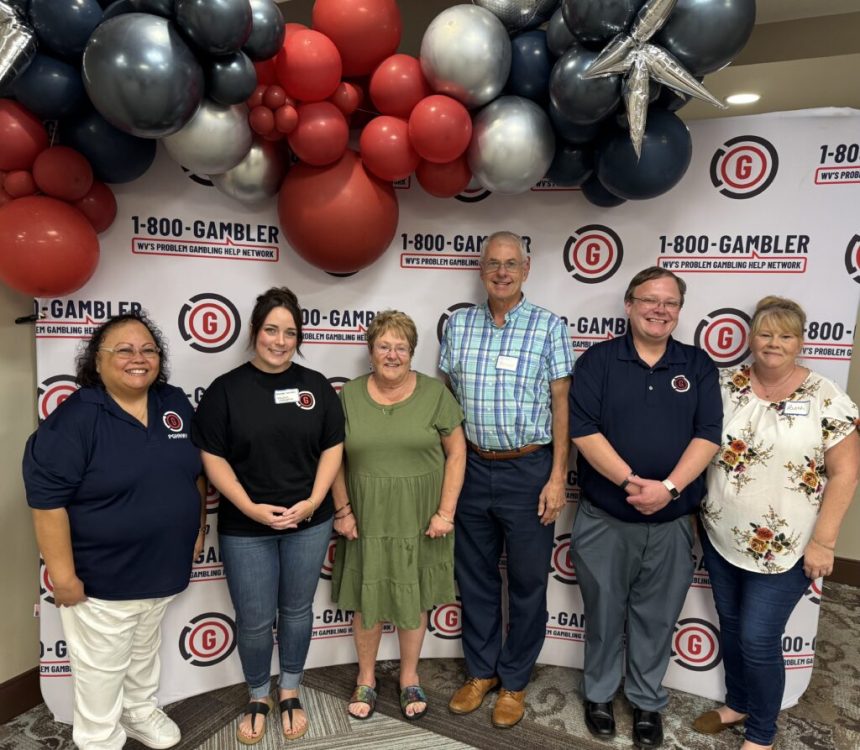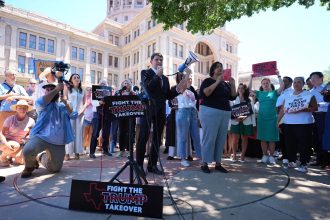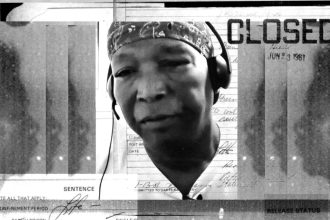The Problem Gambling Network of West Virginia celebrates its 25th anniversary this year. Pictured are Program Director Maricel Bernardo, Program Coordinator Kriston Vanhorn, Peers Chris Mahoney and Merritt Moore, Program Coordinator Nick Andrick and Helpline Coordinator Beth Roach. (Photo courtesy of First Choice Services)
By the time Beth Roach reached out to West Virginia’s Problem Gambling Help Network last year, her gambling addiction had already cost her relationships, her job, her vehicle and her house. It nearly cost her her life.
“I knew that I had two choices: I could either get help or I was going to end my life,” Roach said.
When she messaged the 1-800-Gambler helpline, Roach was connected to counseling and other resources for her addiction.
“I’ll never forget — I chatted in on a Friday afternoon and I saw my counselor on Saturday morning,” she said. “They got me in that quick.”
This year marks the 25th anniversary for the Problem Gambling Help Network, which runs the state’s 24-hour 1-800-Gambler helpline. The network is operated by First Choice Services and funded through the West Virginia Lottery.
Last year the program helped connect about 1,500 people with help for their gambling addiction, said Sheila Moran, marketing and communications director for First Choice Services.
“….Every state has a 1-800-Gambler,” Moran said. “What we do is a little different than other states — we have a pretty comprehensive treatment program.”
Helpline employees offer caller crisis counseling and connect them to an array of treatment services, ranging from podcasts, self-help books and apps, on up to more formal mental health help, Moran said.
“Some people are ready for serious treatment, and so in that case, we link them with one of our counselors who are trained in treating gambling addiction, and we pay for that treatment,” she said. “And they can go up to 20 times to see them.”
The network also offers occasional retreats where people interested in gambling addiction recovery can gather in person for two days at a state park or another venue to connect with others and with treatment counselors.
A retreat was where Roach’s treatment really took off, she said.
“[The retreat was] where I really started doing better in my recovery,” she said. “Because at that point, when I went to that retreat, I was just barely getting through every day.”
The network’s website has information and a quiz to help people determine whether their gambling is a problem. The best indication, Moran said, is if people continue to gamble even though it has negative consequences, she said.
“We’ll get calls from people who say, ‘how can I have a gambling problem? I’m well off. I’m wealthy.’ Well, it’s really not about the money,” she said. “If you keep gambling, even though your wife is mad at you and you’ve lost your job, that’s a problem. So that’s kind of a global definition of addiction.”
At least one in 50 West Virginians struggle with problem gambling, according to the network.
Often, people will start with safer gambling — setting rules and limits for themselves. Then they’ll break those limits, lose money they never intended to, and start gambling more to make up for that loss, she said.
“That’s when it first starts to cross over, when people go from recreational gambling to maybe problematic gambling, especially when they start seeing it as a way to make money,” she said.
Roach started gambling in 2017 after visiting a casino. The casino became something for her and her husband, then empty nesters, to do on weekends. But the weekend trips turned into every weekend.
Then, she’d go throughout the week and she started going on her own, spending more and more money.
“I would say within four months, it had become a problem, and not to the point of the problem that it was when I stopped gambling,” Roach said. “But it was a problem because I was going more than just recreation. I was spending a little bit more, and it was just too much time… it was more of a time thing.”
In Roach’s case, a medication she was prescribed for restless leg syndrome has been linked to compulsive behavior, including gambling. She only learned of the connection afterwards in counseling.
The most common types of gambling have changed through the years, Moran said. When the network first started in 2000, most people were calling about slot machines, then video poker parlors, she said. Nowadays, callers are mostly betting online.
In the last few years, the helpline’s call volume has doubled, mostly because of young men calling about online sports betting, she said.
“We’re getting a whole lot of calls from young men who, frankly, I never thought would call us, because I thought, ‘Oh, they’re not going to call a helpline,’” Moran said. “I was wrong. So now they’re making up a lot of our calls.”
Last year the program had about 1,500 intakes, which are actually people seeking help for their gambling problem. She distinguishes between intakes and calls because a lot of callers are mistakenly trying to reach customer service for whatever gambling organization they’re using.
The number of intakes is up from 1,200 last year, and has doubled in the last five years because of online gambling, she said.
“It’s not only more access but of course there’s a lot of advertising,” she said of online gambling. “Years ago, there was some stigma, maybe, attached to the idea of going to a casino and gambling. I think that’s completely gone now, especially among young folks. So we’ll just see more and more of them gambling on a regular basis.”
Moran said a significant number of calls — 20 or 30% — come from the loved ones of people struggling with a gambling addiction. Sometimes spouses will find out their wives or husbands have cashed the couple’s retirement funds, or taken out a second mortgage, or racked up a bunch of credit card debt without their knowledge.
“You can imagine how upset they are when they call us,” Moran said. “And so a lot of what our counselors do is probably some marriage therapy in addition to gambling addiction therapy. But we can help them as well, because sometimes they need a bunch of emotional protection, but some solid steps to take to protect themselves financially.
“So we have financial counseling available to them as well as the gambler,” she said.
Short of the telltale signs of losing their homes and 401Ks, Moran said lying is one sign a person may have a problem with gambling addiction. But it can be very difficult to tell, she said.
“If you are with someone, and they do gamble on a regular basis, it’s worth having a financial conversation and maybe even looking into some of these accounts, as far as where the money is going,” Moran said. “If someone’s deceptive about it, it can be very hard. They may be stealing money from work or embezzling or who knows what to get the money to gamble, and you may not be aware of it until you’re also in debt along with them.”
About a year into treatment, Roach, 52, is still working to get her life back on track. She attends a support group, meets with a sponsor and still gets counseling regularly.
She now works as a helpline coordinator at the same helpline that helped pull her out of her addiction.
“I tell [Program Director Maricel Bernardoall] the time, how thankful I am for her for taking a chance on me, because I’m still kind of early in my recovery. But it’s helped me,” Roach said. “I mean, I’ve put in work in other areas, but it helps me. It helps me just as much as I help others.”
For more information about the network’s upcoming retreat or to take a quiz to see if you have a problem with gambling, visit https://www.1800gambler.net/ or call 1-800-426-2537.









